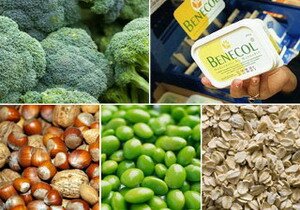 Is there an effective diet to lower cholesterol levels and improve your cardiovascular health?
Is there an effective diet to lower cholesterol levels and improve your cardiovascular health?
Actually there is much you can do to lower your cholesterol before it reaches the point where you need medication. One of the biggest recommendations for a healthy heart is to lower your cholesterol.
There are new medications available today called “statins” which can lower your ldl levels. This medications are necessary and very helpful for some people but they can have side effects too. Cholesterol is not bad but is actually necessary for life. It only causes trouble when it gets out of balance, with too much LDL and too little HDL relative to each other. You want to raise your HDL “good cholesterol” and lower your LDL “bad cholesterol”.
If you do not have severe heart disease yet, there are some ways you can lower your cholesterol naturally without the side effects of statins. If you have a diagnosed heart condition, ask your doctor if any of these supplements can be helpful for you.
Lower Choleterol Naturally with these Foods
Olive oil: The mediteraneans have long used this oil and have a very low incidence of heart disease. Olive oil is a monounsaturated fat which does not contribute to heart disease the way saturated fats do. According to the FDA there is now limited scientific evidence that suggest eating about two tablespoons of olive oil daily may reduce the risk of coronary heart disease due to be in olive oil.
Almonds: in a recent study, 45 people with high cholesterol levels were placed on a diet rich in almonds, olive oil or dairy products. The result after four weeks, the almond group had LDL levels an average of 16 points lower than the olive oil group and 33 points lower than the dairy group. Almonds are rich sources of monounsaturated fat, fiber and the amino acid Argininine also known for helping the heart. Each of these contributes to the cholesterol lowering effect. Even if you are taking cholesterol-lowering medication, try snacking on almonds for a heart healthy treat.
Pistachios: A study of adults with high cholesterol levels (all above 210mg/dL) ate between 2 – 3 ounces of pistachio nuts daily for four weeks showed an improvement of 9% to 14%. Pistachios contain monounsaturated fats which can improve cholesterol and help reduce your risk of heart disease. They are a great nutritious snack which also provide: potassium, calcium, proteins and all the essential amino-acids, vitamins, and phosphorus. They will also fill you up quickly and are not fattening for those on a diet when eaten in moderation.
Fish Oil: The omega 3 fatty acids in fish oil have been proven in numerous studies to be good for preventing cardiovascular disease. The are two long-chain fatty acids , EPA and DHA, in fish oil and both are important for cardiovascular health. Flax seed oil also contains these fatty acids but the body needs to convert them to a usuable form, while fish oil is already available to the body. Most studies have been done on fish oil, however, vegetarians can used flax seeds as well as others who prefer them over fish or fish oil capsules.
Homemade Juices: Juice your way to lower cholesterol. If you find it difficult to get at least five servings of fruits and vegetables daily, try making your own fruit and vegetable juice with a juicer. Juices don’t provide the same fiber content found in whole fruits and vegetables, but they do offer a concentrated dose of the same nutrients and phytochemicals and are so much more nutritious than sodas. Fruit and vegetable juices provide high levels of anti-oxidants which are natural plant compounds that fight free radicals and help protect the body against cancer, heart disease, aging and other degenerative conditions.
Resveratrol: Resveratrol has a number of beneficial health effects, such as anti-cancer, antiviral, neuroprotective, anti-aging, anti-inflammatory and life-prolonging effects have been reported in animal studies. Resveratrol is found in the skin of red grapes and is a component of red wine. In also can be obtained from drinking grape juice for those who don’t drink alcohol.
Butter or Margarine? It turns out neither is very good for you. Butter is high in saturated fat and margarine contains transfats; both of these contribute to heart disease. Fortunatley, now there are butter flavored spreads available in most grocery stores which contain healthy oils and sterols which can actually lower cholesterol. Smart Balance and Spectrum Spread are two that are very good. Look for a spread that does not contain any hydrogented (or partially hydrogenated) oils. Look for spreads that are high in omega 3 fatty acids, low in saturated fats and contain one or more of the following: olive oil, flax oil, or canola.
Good News for Chocolate lovers!
Dark chocolate has been proven to be good for your heart. It must be dark chocolate, however, because milk chocolate contains too much sugar and fat while containing only a fraction of the antioxidants of dark. Some studies have shown dark chocolate can reduce LDL cholesterol (the bad cholesterol) by up to 10 percent.
Garlic: helps prevent and possibly reverse arterial plaque buildup atherosclerosis, a major risk factor for heart attack and stroke and acts as a blood thinner to reduce the risk of blood clots. Try adding one clove of fresh minced garlic to your food daily or you can take a standardized garlic supplement with the advantage of avoiding the infamous garlic breath. Potential side effects include bad breath and indigestion. Because garlic has a blood thinning effect he should not be used if you take aspirin or an anticoagulant drug such as warfarin or Coumadin.


















